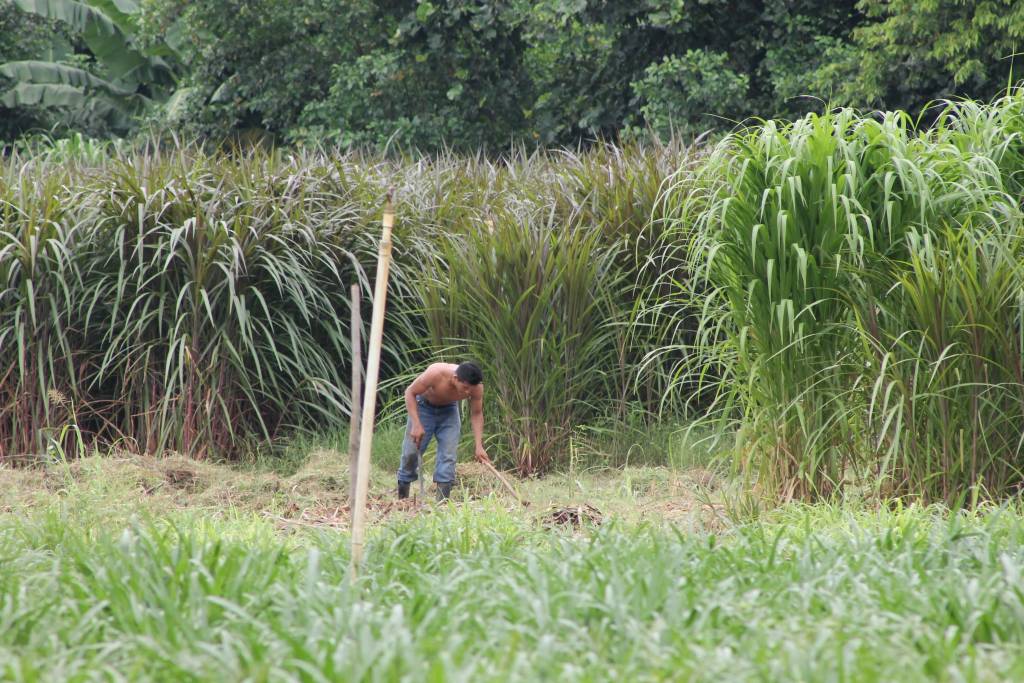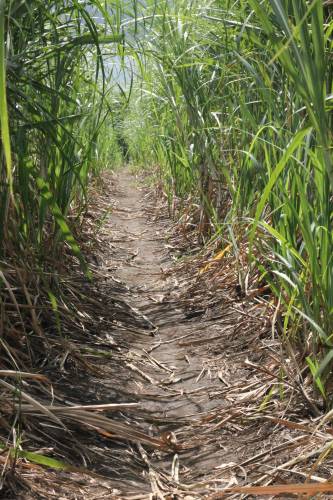Sugar industry contaminates food, water, and health in El Salvador
By Doris Evangelista | Asociacion Red Uniendo Manos El Salvador (ARUMES)
“How could we have ever believed that it was a good idea to grow our food with poisons?”
– Jane Goodall
In El Salvador, most farmers do not own the land they work and for some time the industrial farming of sugar cane has extended like a plague, taking over the best plots of land, displacing family farming, and greatly affecting the lives of farmers.
Families live in homes on the edge of the sugar cane plantations and children go to schools that are within mere feet of the fields, and the children play among the cane.
I remember a visit to one of these communities. It was midday, right when school got out. I saw a group of children running down the dirt road, their clothes and skin drenched as if they had been out in a downpour. They said that a crop duster had flown over as they walked along the road and ‘rained’ on them. These children had been soaked with pesticide.

Ofelia Guidos shares story of the difficult impact of fumigation on her family in San Luis Talpa, El Salvador. Photo by Valery Nodem.
The families of these children saw this toxic soaking as something normal – a regular occurrence. No one complains, no one protests. If they did protest, who would listen?
Recently, Dewayne Johnson, a California groundskeeper, was awarded $289 million in damages after suing Monsanto, arguing that its herbicide Roundup likely caused his terminal cancer. Justice may have been served in this case, but here in El Salvador that kind of justice is not known. In this small country, there are no laws or official guidelines to regulate the aerial fumigation of toxic pesticides or ‘slash and burn’ agriculture.
Glyphosate, the active ingredient in Roundup, is one of the herbicides used for the aerial spraying that is regularly done three or four times per harvest, while the spraying by hand is done once or twice a month in El Salvador.
Our country prides itself on the exportation of thousands of tons of sugar to the continent of Asia but this is at the cost of the pain and suffering of many Salvadoran families and entire communities that are contaminated by pesticides. Families weep and mourn the absence of their loved ones who have died as a result of chronic renal insufficiency, poor function of the kidneys, and other illnesses associated with toxic herbicides and pesticides.
“These poisons that they spray are slowly killing us”
All Salvadoran territory is affected, but those most adversely affected live along the coast where communities have suffered for decades from problems like chronic renal insufficiency, cancer and other maladies. The Ministry of Health nephrologist, Dr. Carlos Orantes confirms that glyphosate and other toxic pesticides used in the industrial farming of sugar cane are one of the causes of renal insufficiency, as are horrible working conditions such as extreme heat and lack of shade which lead to dehydration and other illnesses.
Another harmful practice related to the cultivation of sugar is the burning of the cane when it is ready to be harvested. The burning takes place with no advance warning, and every harvest, families are forced to flee from their homes to escape the toxic smoke and extreme heat. The ash that remains on the ground is washed into the rivers and streams with the first rains, contaminating the water. There is always a massive surge in animal deaths soon after a burn.
Toxic herbicides and pesticides have contaminated ground water and family wells. Communities and families have no choice but to continue to drink and use contaminated water.
On June 15, 2015, ARUMES, the Joining Hands Network in El Salvador, brought together affected families from the coastal area of the country to give their testimonies to the Office of the Human Rights Ombudsman (PPDH) which led to a formal investigation into the human rights violations these families had suffered due to the bad practices of the sugar cane industry.
As a result of the yearlong investigation, PPDH together with ARUMES published a “Report on the Use of Agrotoxins in El Salvador and the Impact on Human Rights”. The report concluded that herbicides and pesticides have negatively impacted the health of the general population in El Salvador. And the report called on the representatives of the Legislative Assembly along with the Ministers of Health, Agriculture and Environment to monitor and take measures to prohibit the use of herbicides and pesticides on a national level for all types of crops.
Salvadoran Worship Song:
No temas arriesgarte por que contigo Yo estaré
Do not fear to put yourself at risk because I will be with you
No temas anunciarme porque en tu boca yo hablaré,
Do not fear to proclaim Me because I will speak through your mouth
Te encargo hoy mi pueblo para arrancar y derribar
I charge you my people to pull up and tear down
Para edificar: destruirás y Plantarás
To build them up: you will destroy and you will plant
Tengo que gritar, tengo que arriesgar
I have to shout, I have to risk it
Tengo que andar, tengo que luchar.
I have to move, I have to struggle.
¡ Hay de mi si no lo hago!
What of me, if I don’t!
The profits gained from these pesticides provide those that produce and distribute them in countries like El Salvador with tremendous power but people are dying.
The families that own local distributors finance political parties, politicians, and decision makers which makes approving a law that bans herbicides and pesticides very difficult to achieve.
In the case of one family that lives in one of the affected municipalities, a mother had five sons, who all worked on the sugar cane plantation as fumigators and wore backpacks full of pesticide to spray the cane by hand. Two of her sons had already died of renal insufficiency while on dialysis and when her third son was diagnosed as well, , he decided to take his own life swallowing the same poison that he sprayed on the cane.
“All of us here know of the risk, but we don’t have any other alternatives for work. In these communities, there is no hope, here not even God is with us., “ she says with tears and sadness.
For our community partners, ARUMES is the voice of the marginalized, of the malnourished and the contaminated, and we will continue walking alongside them in their struggle for justice for the unprotected and attempt to help them know that God is with them.

